I got invited to join The Big Picture with Thom Hartmann last night to talk oil subsidies and clean energy as part of my day job with the National Wildlife Federation. How'd I do?
Friday, March 30, 2012
Thursday, March 29, 2012
Walkable Development Again Blocked in Chesapeake
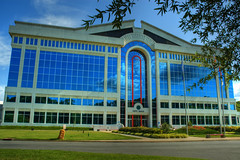 Neighborhood opposition has killed a plan to build 260 apartments in Chesapeake and instead only 30 to 40 single-family houses will be built:
Neighborhood opposition has killed a plan to build 260 apartments in Chesapeake and instead only 30 to 40 single-family houses will be built:[NIMBY activist Miguel] Walker also says the quality of Hickory schools would draw families with school-age children to the Chapel Hill Apartments.That Breckinridge development would've brought 1,500 new living spaces and millions more in economic development to an area in decline, but Chesapeake blocked it anyway, again citing concerns about new students. As Matt Yglesias points out, "'the schools here are good and people will want to send their children to them' operating as a reason to not let people move to a neighborhood has a particularly toxic impact on educational equity and effectiveness."
"I couldn't blame anybody who would want to," he said. "But it also comes down to renters. I don't know if this sounds terrible: Renters aren't really going to be invested in the community."
A similar saga played out last month in Western Branch, but on a larger scale, when City Council killed the massive Breckinridge development. Walker said he's expecting a call from John Arthur, who spearheaded the fight against Breckinridge, but he also has picked up pointers about the Western Branch efforts from reading newspaper accounts.
You often hear people say that Americans must want sprawling suburban lifestyles, because otherwise more people would live in smart growth-style dense developments and any attempt to say otherwise is a secret UN socialist plot. But here we have two very real examples of existing single-family homeowners preventing new apartments from being built, forcing hundreds of people to live further out and drive further to get where they want to go, spending more on gas and spending less time with their families in the process.
Posted by
TheGreenMiles
at
Thursday, March 29, 2012
Wednesday, March 28, 2012
Bigger Isn't Better: Why Gigantic Produce is a Terrible Value
 My girlfriend noticed these giant tomatoes the size of cantaloupes at Harris Teeter the other day. It's a produce-wide trend - softball-sized avocados, strawberries that are no longer bite-sized, apples that are more of a meal than a snack.
My girlfriend noticed these giant tomatoes the size of cantaloupes at Harris Teeter the other day. It's a produce-wide trend - softball-sized avocados, strawberries that are no longer bite-sized, apples that are more of a meal than a snack.Many people look at giant portions and see a bargain, but abnormally large fruits and vegetables are a terrible value. Especially since many fruits and vegetables are sold by weight, you're paying an inflated price for watered-down taste and nutrition:
- Plants give about the same amount of nutrition to each fruit or vegetable no matter its size, so supersizing just dilutes it
- By breeding for size over nutrition & taste, there's evidence conventional produce nutrition & taste has genetically declined over time
- Fruits and vegetables need time to soak up the sun & develop flavor, but they can be robbed of that by artificially accelerated growing processes
Posted by
TheGreenMiles
at
Wednesday, March 28, 2012
Tags:
food,
fruits,
grocery stores,
organic products,
produce,
shopping,
tomatoes,
vegetables
0
comments

Tuesday, March 27, 2012
Car2go Ad Features Places No One In Their Right Mind Would Drive To
Zipcar is getting some new competition in the DC market with the entries of Daimler North America's Car2go and Hertz on Demand.
I understand advertising is more about evoking emotions than literally saying buy this vacuum cleaner, but this Car2go ad on Metro did a lousy job of making car sharing seem useful. Dupont Circle, Chinatown, the Lincoln Memorial, the Kennedy Center, Ben's Chili Bowl on U Street - what do they have in common? They're places no one in their right mind would drive to from an in-city car sharing location - all are right on top of Metro stations, have really bad parking, or both. Metro, bike sharing, a cab, or a pedicab would be better options.
Even the activities don't seem either exciting or like good reasons to rent a car. Coffee, the bank, the gym - if you don't have a car, why the hell would you sign up for a gym you can't get to on foot, by bike or by Metro? Hike the Shenandoah, pick up your girlfriend at BWI, shopping at Tysons - wouldn't those be better reasons to get a short-term rental AND sound less mundane?
Why do I care? I want collaborative consumption to work because it has huge potential to help the environment, save people tons of money, and make local economies more efficient:
I understand advertising is more about evoking emotions than literally saying buy this vacuum cleaner, but this Car2go ad on Metro did a lousy job of making car sharing seem useful. Dupont Circle, Chinatown, the Lincoln Memorial, the Kennedy Center, Ben's Chili Bowl on U Street - what do they have in common? They're places no one in their right mind would drive to from an in-city car sharing location - all are right on top of Metro stations, have really bad parking, or both. Metro, bike sharing, a cab, or a pedicab would be better options.
Even the activities don't seem either exciting or like good reasons to rent a car. Coffee, the bank, the gym - if you don't have a car, why the hell would you sign up for a gym you can't get to on foot, by bike or by Metro? Hike the Shenandoah, pick up your girlfriend at BWI, shopping at Tysons - wouldn't those be better reasons to get a short-term rental AND sound less mundane?
Why do I care? I want collaborative consumption to work because it has huge potential to help the environment, save people tons of money, and make local economies more efficient:
Posted by
TheGreenMiles
at
Tuesday, March 27, 2012
Monday, March 26, 2012
Red Sox Get Bigger Footprint: Sprawling Spring Park Skimps on Green
 Given that Fenway Park is a green diamond, I was surprised to find on a recent trip to Florida that the new Boston Red Sox spring training facility, is the least-environmentally conscious new sports venue I've visited in recent years. And if they couldn't get JetBlue Park's green right, is it any wonder they also screwed up the height of its Green Monster?
Given that Fenway Park is a green diamond, I was surprised to find on a recent trip to Florida that the new Boston Red Sox spring training facility, is the least-environmentally conscious new sports venue I've visited in recent years. And if they couldn't get JetBlue Park's green right, is it any wonder they also screwed up the height of its Green Monster?"Environmentally-sustainable features will be incorporated throughout the facility and Complex, and the considerable landscaping will feature vegetation indigenous to the area," reads the JetBlue Park website. It's hard to tell exactly what that means, or whether more ambitious environmental efforts will be undertaken down the road. But how do you build a new ballpark with no solar panels in Florida, one of the states most threatened by global warming?
JetBlue Park's meager positive environmental measures are more than offset by its sprawling location. While its predecessor, City of Palms Stadium, was located in the center of the city, JetBlue Park is 10 miles outside central Fort Myers. That meant the vast majority of fans had to drive and most of them came came off the same exit of I-75, backing up traffic for miles. Even if the stadium was powered with 100% renewable energy, its carbon footprint would still be high because it asks 12,000 fans each game to drive so far outside the city.
And the fans who did take advantage of the ideal biking weather in Florida in March didn't get an ideal reception:
For the grand opening of jetBlue Park, 300 people biked to the new stadium. Those cyclists saved about 2-3 acres of parking. When asked, 76-percent of the bicyclists said they wanted to bike to future games. But jetBlue Park only has permanent bike racks for 50 bikes, with some temporary French barricades on standby.Given the messed-up Monster, bad traffic and brutally long lines at concession stands, I didn't find the dearth of environmental amenities surprising. I've come to think of a venue's lack of green features as Van Halen viewed brown M&Ms - a warning sign that someone's just going through the motions. Poor environmental planning often goes hand in hand with a poorly thought-out overall customer experience.
Posted by
TheGreenMiles
at
Monday, March 26, 2012
Friday, March 23, 2012
Climate Activists Blow the Whistle on "Dominion's Foul Trouble"
 350.org's Bill McKibben and the Chesapeake Climate Action Network's Mike Tidwell says when it comes to investing in clean & secure energy sources, Virginia fouls out:
350.org's Bill McKibben and the Chesapeake Climate Action Network's Mike Tidwell says when it comes to investing in clean & secure energy sources, Virginia fouls out:The problem is the state's largest utility, Dominion Virginia Power. While states like Minnesota and Iowa get 10 to 20 percent of their electricity from wind power alone, creating thousands of jobs, Dominion generates zero electricity for Virginia ratepayers from wind or solar.The rally will be Saturday (March 24) at noon outside Dominion's Richmond headquarters, sign up at EndPowerMadness.com.
Instead, the utility invests overwhelmingly in dirty fossil fuels. Despite rising global warming concerns and smog-filled summer skies in Shenandoah National Park, Dominion plans to increase the renewable-energy slice of its cumulative energy pie by a microscopic 0.4 percent over the next 15 years. You read that right: 0.4 percent.
There's no sign things will change without some loud and much-deserved booing from the crowd. Which is why ratepayers from across the state have set Saturday as "The March to End Dominion's Power Madness."
Posted by
TheGreenMiles
at
Friday, March 23, 2012
Green Summer Choices: Boxed Wine and Canned Beer
Why are boxed wine and canned beer better for the environment, more economical, more convenient?
- They have much lower carbon footprints thanks to the reduced weight of the packaging (glass bottles make up 35% of the weight of a full bottle of beer & 40% of a full the weight of a full bottle of wine). That also makes them much lighter to carry to the party or picnic.
- They're more affordable - a box of wine hold four bottles worth of wine but may cost about the same as one mid-range bottle, and unless you're a hardcore oenophile you won't taste much difference. For beer, a 24-pack of cans usually costs the same as an 18-pack of bottles.
- Don't drink that much wine in one sitting? All the more reason to go with a box, which keeps the wine fresh up to 45 days compared with just a day or two for an opened bottle and also avoids cork taint. Similarly, beer cans block the sunlight that can skunk bottled beer.
Posted by
TheGreenMiles
at
Friday, March 23, 2012
Tuesday, March 20, 2012
Brooklyn Nets to Sell "Brooklynized" Bottled Water, Test Bounds of Human Gullibility
When the Nets basketball team moves to its new arena in Brooklyn, it will sell its fans "Brooklynized" bottled water. You see, apparently people from New York City, not unlike the parents of Lake Wobegon's entirely-above-average children, have convinced themselves their tap water is exceptional.
But this is not Brooklyn tap water put into bottles - no, that would make too much sense for the nonsensical business of bottled water. A company in Florida will take Florida tap water, do little more than play Jay Z's Empire State of Mind for it, then declare it "Brooklynized" and sell it to Nets fans for god knows how much:
To repeat: There is no evidence bottled water will make you any healthier or happier than tap water. However, there is plenty of evidence it will make you significantly poorer than if you just brought a refillable mug or bottle with you.
We are all dumber for having heard this idea. Nets owner Bruce Ratner, I award you no points, and may god have mercy on your soul.
Via Deadspin
But this is not Brooklyn tap water put into bottles - no, that would make too much sense for the nonsensical business of bottled water. A company in Florida will take Florida tap water, do little more than play Jay Z's Empire State of Mind for it, then declare it "Brooklynized" and sell it to Nets fans for god knows how much:
The water comes from a new but rapidly growing Florida-based, Larry King–approved franchise, the Original Brooklyn Water Bagel Co., which claims it's found the secret to making great bagels: "Brooklynize" the water via a custom filtration process so it resembles "Brooklyn" water, which of course is actually just New York City water. (The company says the water itself comes from "regional bottling facilities.")As Norman Oder points out at the New York Magazine blog, "arena operators could simply turn on the taps and fill empty bottles with authentic Brooklyn water. But we guess a move like that would lack a certain capitalist zeal."
At least one person is already going after "Brooklynized" water. The Fort Lauderdale Sun-Sentinel reported last week that a franchise buyer in Florida sued the company, claiming that "the water filtration system is not unique and does not render water equivalent to Brooklyn water." And, yes, the buyer is going after Larry King, too. The company, unsurprisingly, denies the allegations.
To repeat: There is no evidence bottled water will make you any healthier or happier than tap water. However, there is plenty of evidence it will make you significantly poorer than if you just brought a refillable mug or bottle with you.
We are all dumber for having heard this idea. Nets owner Bruce Ratner, I award you no points, and may god have mercy on your soul.
Via Deadspin
Posted by
TheGreenMiles
at
Tuesday, March 20, 2012
Sunday, March 18, 2012
Louis CK: Shouldn't All Christians be Environmentalists?
Continuing the rebuttal to Rick Santorum's contention that God's cool with us destroying the planet, from Louis CK's Live at the Beacon Theater:
His rejection of environmental stewardship only shows the depth of Santorum's cafeteria Catholicism - Pope Benedict XVI himself is a climate activist. There's also the evangelical Creation Care movement, the Jewish Climate Initiative and the Muslim-hosted international conference on climate change.
Graphic via WarmingGlow.UpRoxx.com - go see their Louis CK slideshow.
His rejection of environmental stewardship only shows the depth of Santorum's cafeteria Catholicism - Pope Benedict XVI himself is a climate activist. There's also the evangelical Creation Care movement, the Jewish Climate Initiative and the Muslim-hosted international conference on climate change.
Graphic via WarmingGlow.UpRoxx.com - go see their Louis CK slideshow.
Posted by
TheGreenMiles
at
Sunday, March 18, 2012
Tags:
creation care,
God,
humor,
Louis CK,
oil drilling,
polar bears,
religion,
Rick Santorum
2
comments

Friday, March 16, 2012
Warm Spring is Bad News for Virginia Wine
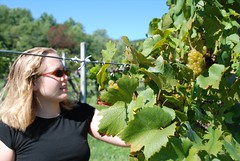 The global warming-fueled heat wave that's gripped much of America this month may be good news for March picnics, but it's terrible for Virginia wine lovers. Wine grape vines are already waking up, posing a twofold threat - hotter temperatures can mean less flavorful wine, and a sudden frost could devastate the crop:
The global warming-fueled heat wave that's gripped much of America this month may be good news for March picnics, but it's terrible for Virginia wine lovers. Wine grape vines are already waking up, posing a twofold threat - hotter temperatures can mean less flavorful wine, and a sudden frost could devastate the crop:Workers at Tomahawk Mill Winery in Chatham are certainly concerned. They say they are usually working in the cold right now wearing two pairs of socks and gloves. But while it's nice to work in this weather, the grapes don't like it one bit.
Corky Medaglia, owner of Tomahawk Mill Winery, always says: "When God gives you lemons you make lemonade. And when God gives you grapes, you make wine."
But within his 17 years working the vineyards, he has never seen a winter like this one. "Sap is coming up because the temperatures are going up. And this guy thinks it's spring time," said Medaglia.Meteorologists say there's a 50/50 chance of a surprise frost. And looking ahead, hotter summers are no kinder to wine grapes - when temperatures top 95 degrees, the vine's respiration system can shut down.
(To be clear, the photo with this story is from 2007, not a photo of what the grapes look like right now.)
Posted by
TheGreenMiles
at
Friday, March 16, 2012
'God Wouldn't Let Us Destroy the Climate': A Brief Rebuttal
So why did God let us light the Cuyahoga River on fire? Does God just really hate Cleveland? What about smog - God hates kids with asthma?
I missed the part in the Bible about God cleaning up our messes for us. God is not our mom - no, wait, mom wouldn't pick up after you, either.
Maybe people like Rick Santorum and Jim Inhofe should stop acting like bratty kids and take responsibility for our mess instead of leaving it for someone else to deal with.
I missed the part in the Bible about God cleaning up our messes for us. God is not our mom - no, wait, mom wouldn't pick up after you, either.
Maybe people like Rick Santorum and Jim Inhofe should stop acting like bratty kids and take responsibility for our mess instead of leaving it for someone else to deal with.
Posted by
TheGreenMiles
at
Friday, March 16, 2012
Thursday, March 15, 2012
New Study: Global Warming Could Push DC Cherry Blossoms into February
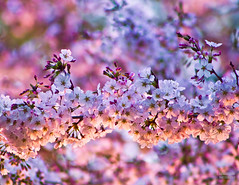 The National Park Service now agrees with what the Capital Weather Gang first predicted - our warm winter will have the Tidal Basin's cherry blossoms challenging the earliest peak bloom record, continuing the global warming-fueled trend. As this photo from Flickr's Richard Cline shows, they're already beginning to emerge.
The National Park Service now agrees with what the Capital Weather Gang first predicted - our warm winter will have the Tidal Basin's cherry blossoms challenging the earliest peak bloom record, continuing the global warming-fueled trend. As this photo from Flickr's Richard Cline shows, they're already beginning to emerge. A 2000 Smithsonian study showed the climate crisis already has the cherry blossoms emerging about a week earlier than they used to - but a new report says that could be just the tip of the iceberg:
Now comes a team of scientists theorizing that with drastic warming of the globe, future decades could see blossom times not just a few days early but advanced by almost a month.Oddly, the study doesn't frame the challenge not as one of limiting our use of carbon-intensive fuels like oil and coal, but one strictly of limiting population growth:
That could mean a bloom process that begins in January, rather than February, a blooming period in February instead of March, and a peak bloom in early March, instead of early April, the research suggests.
According to the more dire global warming scenario the scientists used — one with unchecked global population growth — the District’s cherry trees could be blooming 29 days earlier by 2080 and 13 days earlier by 2050.With more near-record warmth forecast today, it's a reminder that we can't wait to cut carbon pollution - and that if we don't, earlier cherry blossoms will be the least of our worries.
A less severe scenario, with eventually declining population, had the trees blooming 10 days earlier by 2080 and five days earlier by 2050.
Posted by
TheGreenMiles
at
Thursday, March 15, 2012
Wednesday, March 14, 2012
New Study Details Threat of Global Warming-Fueled Sea Level Rise in Virginia
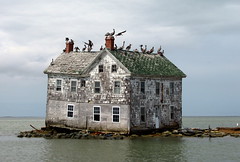 Sea levels have already risen 8 inches since 1880 and thanks to global warming are forecast to rise at least several more feet in the lifetime of a child born today. A new study from Climate Central takes a look at what that means for people who live on America's coasts:
Sea levels have already risen 8 inches since 1880 and thanks to global warming are forecast to rise at least several more feet in the lifetime of a child born today. A new study from Climate Central takes a look at what that means for people who live on America's coasts:The studies look at people who live in homes within three feet of high tide, whereas old studies looked just at elevation above sea level, according to work published in the peer-reviewed journal Environmental Research and an accompanying report by Climate Central.And what about here in Virginia? I entered a very modest number - three feet of sea level rise, storm surge & tide - into the ClimateCentral.org model & here's what I got:
That's an important distinction because using high tide is more accurate for flooding impacts, said study co-author Jonathan Overpeck, a scientist at the University of Arizona's Institute of the Environment. And when the new way of looking at risk is factored in, the outlook looks worse, Overpeck said.
"It's shocking to see how large the impacts could be, particularly in southern Florida and Louisiana, but much of the coastal U.S. will share in the serious pain," Overpeck said.
Things below +3ft in Virginia:View the model for yourself and see what different levels of sea level rise would mean for your community:
Over 1 in 6 chance sea level rise + storm surge + tide will overtop +3ft by 2020 at nearest flood risk indicator site: Lewisetta - Potomac River, 116 miles away.
- Population 58,507 0.7%
- Homes 28,511 0.8%
- Acres 157,123 0.6%
Posted by
TheGreenMiles
at
Wednesday, March 14, 2012
Tuesday, March 13, 2012
WJLA Makes Coverage of Climate's Impact on Warm Weather Look Easy
Reporters make covering the relationship between extreme weather and climate change seem really hard. It doesn't have to be! Take today's story from WJLA's John Gonzalez:
Many reporters think the way to dodge politics and controversy is to avoid mentioning the connection between climate change and extreme weather altogether. Just the opposite! Omitting facts and leaving a void of confusion in their place is no better than manufacturing a false "balance" with he said, she said reporting.
- It's much warmer than average
- That's good in some ways and bad in others
- Climate science tells us it fits a long-term pattern and we can expect more of it if we don't cut our carbon pollution
- Moms doing their exercises outdoors! With cute babies!
Many reporters think the way to dodge politics and controversy is to avoid mentioning the connection between climate change and extreme weather altogether. Just the opposite! Omitting facts and leaving a void of confusion in their place is no better than manufacturing a false "balance" with he said, she said reporting.
Posted by
TheGreenMiles
at
Tuesday, March 13, 2012
NASA's James Hansen: Continued Climate Inaction "Immoral"
Here's a new TED Talk from Dr. James Hansen, NASA climate scientist. Dr. Hansen explains how he wrote a paper in 1981 predicting "the 21st century would see shifting climate zones, creation of drought prone regions in North America and Asia, erosion of ice sheets, rising sea levels, and opening of the fabled Northwest passage. All of these impacts have since either happened or are now well underway."
If you're at the office and can't watch video, read a good summary of Hansen's talk from ClimateProgress.org.
It's a stark reminder that while polluters & their allies accuse climate scientists of being "alarmist," the predictions of climate scientists to this point have more often been too conservative. The United Nations' Intergovernmental Panel on Climate Change just issued its Fourth Assessment in 2007, but many climate scientists already think its predictions were far too cautious given our rapid climate changes and the continued acceleration of global carbon pollution.
By the way, are you familiar with TED Talks? The acronym stands for Technology, Entertainment & Design and the organization describes itself simply as a "nonprofit devoted to Ideas Worth Spreading." Their podcasts are indispensable - brilliant ideas explained in easy to understand terms in around 15 minutes.
If you're at the office and can't watch video, read a good summary of Hansen's talk from ClimateProgress.org.
It's a stark reminder that while polluters & their allies accuse climate scientists of being "alarmist," the predictions of climate scientists to this point have more often been too conservative. The United Nations' Intergovernmental Panel on Climate Change just issued its Fourth Assessment in 2007, but many climate scientists already think its predictions were far too cautious given our rapid climate changes and the continued acceleration of global carbon pollution.
By the way, are you familiar with TED Talks? The acronym stands for Technology, Entertainment & Design and the organization describes itself simply as a "nonprofit devoted to Ideas Worth Spreading." Their podcasts are indispensable - brilliant ideas explained in easy to understand terms in around 15 minutes.
Posted by
TheGreenMiles
at
Tuesday, March 13, 2012
Monday, March 12, 2012
Ken Cuccinelli's Quixotic War on Climate Science Finally Ends
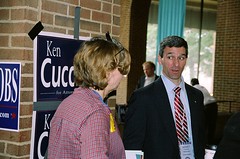 How much damage has Virginia Attorney General Ken Cuccinelli done with his baseless legal attacks on climate science? The Washington Post editorial board surveys the damage done by Cuccinelli's climate witch hunt:
How much damage has Virginia Attorney General Ken Cuccinelli done with his baseless legal attacks on climate science? The Washington Post editorial board surveys the damage done by Cuccinelli's climate witch hunt:This month, after nearly two years of legal proceedings, the Virginia Supreme Court halted the attorney general’s investigation of Mr. Mann, who used to teach at the University of Virginia. Twisting a law designed to root out embezzlement of state funds and the like, the attorney general had demanded oceans of documents — including Mr. Mann’s e-mail correspondence — from U-Va. But, along with some technical legal problems with his demand, Mr. Cuccinelli didn’t offer any reasonable suspicion that Mr. Mann had committed anything resembling fraud — even as the attorney general proposed violating scientists’ sacrosanct freedom to conduct research without political pressure. Multiple independent reviews of Mr. Mann’s record have found that the professor did little more than participate in the normal push-and-pull of scientific inquiry. [...]Tea Party activists claim to stand for fiscal restraint - then waste huge piles of taxpayer money on political witch hunts. Tea Party activists claim to stand for freedom - then bully scientists whose research contradicts Tea Party political beliefs. Tea Party activists claim to stand for limited government - then work to pass laws mandating the invasion of women's bodies.
Now that the Supreme Court has shut Mr. Cuccinelli down, what’s left is a range of consequences that can only hurt the commonwealth. The university had to raise nearly $600,000 for legal fees — money the cash-strapped university should have been able to use for something productive. On top of that are the public resources of the attorney general’s office that Mr. Cuccinelli wasted. Scientists in Virginia now have reason to wonder whether they will suffer similar pressure if they publish research government officials don’t like. And, because of some of the Supreme Court’s legal findings, the powers of the attorney general to pursue actual fraud have been clipped.
Fraud like Cuccinelli's is exactly what they demand. If GOP activists continue to let the Tea Party inmates run the asylum, we should only expect more of it.
Posted by
TheGreenMiles
at
Monday, March 12, 2012
Virginia Home to 4 of SELC's Top 10 Endangered Places
The Southern Environmental Law Center recently released its Top 10 Endangered Places of 2012. Virginia has four of the top 10, a testament to both Virginia's immense natural beauty and our Republican-controlled government's disinterest in preserving it.
Posted by
TheGreenMiles
at
Monday, March 12, 2012
Saturday, March 10, 2012
President Obama on Investing in a Clean Energy Future
President Obama delivers his weekly address from the Rolls-Royce Crosspointe Centre plant in Petersburg, Virginia that makes fuel-efficient jet engines:
Posted by
TheGreenMiles
at
Saturday, March 10, 2012
Friday, March 9, 2012
Investigation Says Fracking Caused Ohio Earthquakes
 An investigation by Ohio authorities has definitely linked hydraulic gas fracking with a series of earthquakes in the Youngstown region:
An investigation by Ohio authorities has definitely linked hydraulic gas fracking with a series of earthquakes in the Youngstown region:A preliminary report released by the Ohio Department of Natural Resources on Friday based the conclusion on "a number of coincidental circumstances." Factors included the opening of D&L Energy's well in December 2010, quakes being clustered around the well bore, a fault since identified in the bedrock, and evidence from monitoring.The U.S. Geological Survey has FAQs on earthquakes caused by fracking.
The state will impose tough new brine disposal regulations as a result. Future injection into Precambrian rock will be banned and state-of-the-art pressure and volume monitoring will be required. Electronic tracking systems will be required to identify chemicals in the fluids entering the state.
Posted by
TheGreenMiles
at
Friday, March 09, 2012
Thursday, March 8, 2012
What Does Poor Scientific Literacy Mean for Climate Action?
 The latest National Science Foundation poll on scientific literacy (PDF) once again reveals America's knowledge of basic scientific issues hasn't improved much over the last three decades. While more people know lasers are light-based and antibiotics don't work on viruses, fewer people say the universe began with a Big Bang. And depressingly, a majority of Americans don't know it takes a year for the Earth to circle the sun or that humans evolved from earlier primates.
The latest National Science Foundation poll on scientific literacy (PDF) once again reveals America's knowledge of basic scientific issues hasn't improved much over the last three decades. While more people know lasers are light-based and antibiotics don't work on viruses, fewer people say the universe began with a Big Bang. And depressingly, a majority of Americans don't know it takes a year for the Earth to circle the sun or that humans evolved from earlier primates.That's the grain of salt with which I take polling about whether Americans acknowledge climate science. I mean, if more Americans know the Earth is warming than know it takes one year for the Earth to go around the sun ... that's positive from a climate action perspective, right? Especially when the media won't even connect higher temperatures to the climate crisis. The numbers are still pretty poor for knowing that warming is man-made - but as the NSF poll shows, the more complex the concept, the worse the numbers.
Posted by
TheGreenMiles
at
Thursday, March 08, 2012
Monday, March 5, 2012
Why Not Just Buy Real Maple Syrup?
Log Cabin Syrup's front label now blares "NO HIGH FRUCTOSE CORN SYRUP." But on the back label, the first ingredient: Corn syrup.
Obviously there's a cost-difference - pure Vermont maple syrup costs about four times more than corn-based syrup, in part because Congress lavishes tax giveaways on (mostly corporate) U.S. corn production. I think there's another subtle factor in play: It tastes worse, so it must be better for you, right? Nope: Corn-based syrup has just as many calories as real maple syrup.
When you're shopping, there's an instinct to grab for the huge cheap jug. But for the average person, how much syrup do you really need? A bottle of Massachusetts maple syrup in my refrigerator has lasted me well over a year. And as for families, aren't you better off teaching your kids to use the good stuff judiciously rather than letting them drown their pancakes in the cheap (but still high calorie) stuff?
Obviously there's a cost-difference - pure Vermont maple syrup costs about four times more than corn-based syrup, in part because Congress lavishes tax giveaways on (mostly corporate) U.S. corn production. I think there's another subtle factor in play: It tastes worse, so it must be better for you, right? Nope: Corn-based syrup has just as many calories as real maple syrup.
When you're shopping, there's an instinct to grab for the huge cheap jug. But for the average person, how much syrup do you really need? A bottle of Massachusetts maple syrup in my refrigerator has lasted me well over a year. And as for families, aren't you better off teaching your kids to use the good stuff judiciously rather than letting them drown their pancakes in the cheap (but still high calorie) stuff?
Posted by
TheGreenMiles
at
Monday, March 05, 2012
Friday, March 2, 2012
Survivorman: Kid's Show?
I had never thought of "Survivorman" as a great show for children, until I watched it with some.
I was visiting my friend Everyday Father and we were watching The Blues Brothers on VH1. He was dumbfounded that while every word in the movie even close to a curse was carefully censored, the commercials for shows like Mob Wives were PG-13 level raunchy. As the movie ended, I saw that "Mob Wives" was actually coming on next, so I quickly flipped to the first nature-based show I could find.
I thought the kids would find "Survivorman" dull - instead they were entranced both by the exotic locations and by a human being actually interacting with them. I worried they might be disturbed by scenes of Les Stroud hunting, but they understood he only killed what he needed for food and the scenes were handled tastefully (unlike Bear Grylls gratuitously drinking reindeer blood on his "Man vs. Wild").
More than anything, the kids appreciated Stroud's to-the-camera assessment of his situation. Anytime the kids asked, "What's he doing?" it was only a matter of seconds before Stroud was explaining it to them.
I was visiting my friend Everyday Father and we were watching The Blues Brothers on VH1. He was dumbfounded that while every word in the movie even close to a curse was carefully censored, the commercials for shows like Mob Wives were PG-13 level raunchy. As the movie ended, I saw that "Mob Wives" was actually coming on next, so I quickly flipped to the first nature-based show I could find.
I thought the kids would find "Survivorman" dull - instead they were entranced both by the exotic locations and by a human being actually interacting with them. I worried they might be disturbed by scenes of Les Stroud hunting, but they understood he only killed what he needed for food and the scenes were handled tastefully (unlike Bear Grylls gratuitously drinking reindeer blood on his "Man vs. Wild").
More than anything, the kids appreciated Stroud's to-the-camera assessment of his situation. Anytime the kids asked, "What's he doing?" it was only a matter of seconds before Stroud was explaining it to them.
Posted by
TheGreenMiles
at
Friday, March 02, 2012
Thursday, March 1, 2012
Cherry Blossoms Coming Earlier, But Media Won't Make Climate Connection
UPDATE 3/12/2012: Thanks to our ongoing warm temperatures, the Capital Weather Gang predicts the cherry blossoms could peak March 18, one day short of the earliest on record.
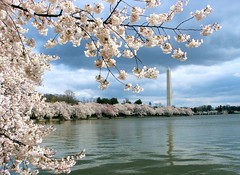 The cherry blossoms at the Tidal Basin in Washington, DC are expected to peak between March 24 and 31, the National Park Service announced today. That's 5 to 10 days earlier than normal and right in line with our global warming-fueled trend - a Smithsonian study found the blossoms come out about 4.5 days earlier than they used to, part of a shift that all plants are feeling.
The cherry blossoms at the Tidal Basin in Washington, DC are expected to peak between March 24 and 31, the National Park Service announced today. That's 5 to 10 days earlier than normal and right in line with our global warming-fueled trend - a Smithsonian study found the blossoms come out about 4.5 days earlier than they used to, part of a shift that all plants are feeling.
Of course, reporters can't say any of that! The peak's just early somehow, and the warm weather must be described as unusual or unseasonable and reporters must never mention that the changes are exactly in line with broader global warming trends.
Just look at coverage of our warm winter. DC's fresh off its 3rd-warmest winter on record and 2 of the top 4 have come within the last 10 years, exactly the type of changes climate scientists say we can expect in a warming world. But on local weather blogs, neither the Washington Post's Capital Weather Gang nor WJLA's StormWatch 7 would even say the word climate.
People sometimes ask me if I'm frustrated that a minority of Americans still don't accept climate science. Just the opposite - I'm amazed the poll numbers are so strong! Even though the media won't connect the dots, Americans are doing it on their own, telling pollsters that changes in their own backyards are convincing them that our climate is warming.
 The cherry blossoms at the Tidal Basin in Washington, DC are expected to peak between March 24 and 31, the National Park Service announced today. That's 5 to 10 days earlier than normal and right in line with our global warming-fueled trend - a Smithsonian study found the blossoms come out about 4.5 days earlier than they used to, part of a shift that all plants are feeling.
The cherry blossoms at the Tidal Basin in Washington, DC are expected to peak between March 24 and 31, the National Park Service announced today. That's 5 to 10 days earlier than normal and right in line with our global warming-fueled trend - a Smithsonian study found the blossoms come out about 4.5 days earlier than they used to, part of a shift that all plants are feeling.
Of course, reporters can't say any of that! The peak's just early somehow, and the warm weather must be described as unusual or unseasonable and reporters must never mention that the changes are exactly in line with broader global warming trends.
Just look at coverage of our warm winter. DC's fresh off its 3rd-warmest winter on record and 2 of the top 4 have come within the last 10 years, exactly the type of changes climate scientists say we can expect in a warming world. But on local weather blogs, neither the Washington Post's Capital Weather Gang nor WJLA's StormWatch 7 would even say the word climate.
People sometimes ask me if I'm frustrated that a minority of Americans still don't accept climate science. Just the opposite - I'm amazed the poll numbers are so strong! Even though the media won't connect the dots, Americans are doing it on their own, telling pollsters that changes in their own backyards are convincing them that our climate is warming.
Posted by
TheGreenMiles
at
Thursday, March 01, 2012
Not So Great Moments in Pedestrian Safety
Came upon this as I was walking to work today - a crew digging up the sidewalk at 17th Street and Sycamore Street in Arlington with no warning for pedestrians heading north. Not that a sign would've helped - I'd have had to backtrack four blocks to get to a crosswalk.
As I approached, the guy in the reflective vest further down the street towards me waving his arms trying to get the guy in the backhoe to stop so I could walk in the bike lane as cars flew past at 35 miles an hour.
As I approached, the guy in the reflective vest further down the street towards me waving his arms trying to get the guy in the backhoe to stop so I could walk in the bike lane as cars flew past at 35 miles an hour.
Posted by
TheGreenMiles
at
Thursday, March 01, 2012
Subscribe to:
Comments (Atom)






